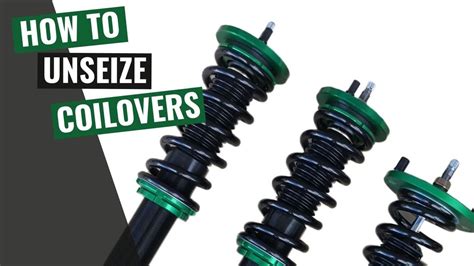How To Unseize Coilovers
Ronan Farrow
Apr 03, 2025 · 3 min read

Table of Contents
How to Unseize Coilovers: A Comprehensive Guide
So, your coilovers are seized? Don't panic! While it can seem daunting, unseizing your coilovers is a manageable task with the right approach and tools. This comprehensive guide will walk you through the process, helping you get your suspension back in top shape. We'll cover everything from identifying the problem to preventative maintenance to ensure this doesn't happen again.
Identifying the Problem: Why are my Coilovers Seized?
Before diving into solutions, let's understand why your coilovers might be seized. Common culprits include:
- Corrosion: This is the most frequent cause. Salt, moisture, and dirt can cause rust and seizing within the threads and components of the coilover.
- Lack of Lubrication: Over time, the lubricant within the coilovers can dry out, leading to friction and seizing.
- Damage: Physical damage to the threads or components can hinder movement and cause seizing.
Assessing the Damage: What Do You Need to Check?
Before you start any work, carefully inspect your coilovers. Pay close attention to:
- Thread Condition: Are the threads heavily corroded or damaged? Look for signs of rust, pitting, or significant wear.
- Movement: Can you manually move the threads by hand? If not, assess how much resistance you encounter.
- Fluid Leaks: Check for any signs of fluid leaks from the coilovers.
Tools You'll Need: Gathering Your Arsenal
To tackle this job effectively, you'll need the following tools:
- Penetrating Oil (like PB Blaster): Essential for loosening seized threads.
- Wrench(es): The correct size to fit your coilover's adjusting collars.
- Adjustable Wrench: Useful for gripping various sizes.
- Vice Grips (optional): For added grip if wrenches aren't enough.
- Hammer (optional): For carefully tapping on stubborn components.
- Gloves: Protect your hands.
- Cleaning Supplies: For cleaning the coilovers after the unseizing process.
Step-by-Step Guide: Unseizing Your Coilovers
Here's a detailed, step-by-step process:
1. Preparation is Key
Begin by thoroughly cleaning the affected areas of the coilovers to remove any dirt or debris that might hinder the penetration of the oil.
2. Applying Penetrating Oil
Generously apply penetrating oil to all seized threads. Allow the oil to soak in for at least 30 minutes, or even overnight for severely seized components. Reapply the oil periodically.
3. Gentle Persuasion
Attempt to loosen the seized threads using your wrenches. Start with gentle pressure and gradually increase it. Avoid using excessive force, as you could damage the components. If one wrench slips, use an adjustable wrench for better grip.
4. Tapping (if necessary)
If the threads are extremely stubborn, you can carefully tap on the wrench with a hammer to help break the seizing. Always use light taps to avoid damage.
5. Persistence Pays Off
Keep repeating steps 2-4, allowing the penetrating oil to work its magic. Patience is key! It might take several attempts and some time to fully unseize the coilovers.
Post-Unseizing Care: Maintaining Your Coilovers
Once you've successfully unseized your coilovers, it's crucial to take steps to prevent future seizing:
- Lubrication: Apply a suitable lubricant to the threads to reduce friction.
- Regular Inspection: Periodically inspect your coilovers for signs of corrosion or wear.
- Cleaning: Keep the coilovers clean and free from dirt and debris.
Preventing Coilovers from Seizing in the First Place
Proactive maintenance is your best bet! Here's how to minimize the risk of seizing:
- Regular Cleaning: Clean your coilovers regularly, especially after driving in harsh conditions.
- Proper Lubrication: Use a high-quality lubricant specifically designed for automotive applications.
- Protective Coating: Consider applying a rust preventative coating to help protect against corrosion.
By following these steps, you can effectively unseize your coilovers and prevent future problems. Remember, patience and the right tools are key! If you're unsure about any part of this process, it's always best to consult with a qualified mechanic.
Featured Posts
Also read the following articles
| Article Title | Date |
|---|---|
| How Big Is 1 Ounce Of Perfume | Apr 03, 2025 |
| Stepsis Knows How To Handle Meat S33 E5 | Apr 03, 2025 |
| Pulse Thc Vape How To Use | Apr 03, 2025 |
| How Big Is A 12 X 18 Poster | Apr 03, 2025 |
| How To Use Spray Wax On Car | Apr 03, 2025 |
Latest Posts
-
How Big Is A 12x18 Canvas
Apr 03, 2025
-
How Big Is A 12 X 18 Poster
Apr 03, 2025
-
How Big Is A 1 12 Scale Rc Car
Apr 03, 2025
-
How Big Is A 1 Carat Ruby
Apr 03, 2025
-
How Big Is A 1 64 Scale Tractor
Apr 03, 2025
Thank you for visiting our website which covers about How To Unseize Coilovers . We hope the information provided has been useful to you. Feel free to contact us if you have any questions or need further assistance. See you next time and don't miss to bookmark.
